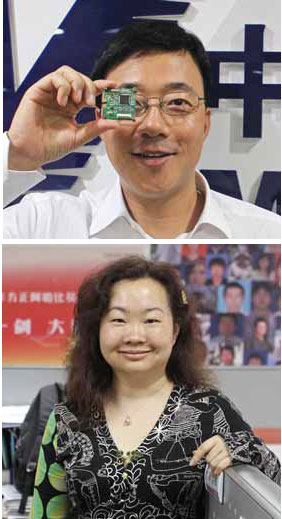Competition, collaboration: all in the game for private firms
Updated: 2012-05-18 08:49
(China Daily)
|
|||||||||||
|
Top: John Deng, chief executive officer of Vimicro, a chip maker for PC cameras. Feng Yongbin / China Daily Above: Scarlet He, executive general manager of Founder Apabi Technology. Feng Yongbin / China Daily |
John Deng is a Chinese entrepreneur who has taken on foreign multinationals and won. Vimicro, the company which he founded in 1999, is now the leading chip maker for PC cameras in the world with a global 60 percent market share.
Companies such as South Korean electronics giant Samsung that started out as competitors in the early days are now among the company's leading customers.
"At the beginning we were competing with Philips and Samsung, but after a series of innovations the multinationals retreated from this market. We became the No 1 and many of them became clients of ours," he says.
The 43-year-old chief executive officer says investing in product development has been the key to keeping ahead of foreign multinationals.
The company invests some 15 percent of its sales revenue in research and development and owns more than 2,500 patents, filed in China, the United States and other jurisdictions.
"We believe our long term success depends on our current investment in technological development, patent application and human resource development," he says.
Another Chinese company has built its success on collaborating with foreign companies.
Founder Apabi Technology, which is based in Beijing and employs 400 throughout China, is one of the country's leading digital publishing technology providers.
Scarlet He, the 40-year-old executive general manager, says the industry is an emerging one so cooperation is more appropriate than trying to gun down rivals.
"In our industry right now, we need cooperation rather than competition. We work with a lot of foreign companies including publishers, technology concerns and also sales channels," she says.
Deng at Vimicro, which floated on Nasdaq in 2005 and employs 1,200 at bases in Beijing, Shanghai and Tianjin as well as Silicon Valley and San Diego, says building a business in China has also involved building some partnerships.
"When we first started we collaborated very deeply with Microsoft to evolve a PC embedded system into Windows," he says.
He adds that while the China market has become tougher and Chinese companies stronger, it would be wrong to write off foreign multinationals since they will remain a force for many years to come.
"The foreign multinationals not only have huge research facilities globally but in terms of their brands, products, services and their guarantees of good service, they remain very, very good. It remains very hard to compete against them and we try very hard," he says.
"Many Chinese companies have failed and we are lucky that we have succeeded in several markets."
He at Founder Apabi says that within digital publishing there still remains demarcation lines between countries with many technology providers sticking to their own markets.
"I don't think foreign competitors will come into the China market just yet since digital publishing is still quite a small market," she says.
"We are a very successful company in terms of technology and the service we offer and in our market position but not in terms of profitability. The margins will increase when the market expands.
"That is when the foreign companies will come in. It is difficult to predict when this will be. It could be five years or even sooner. There probably will be a big bang then."
Deng says his company intends to keep ahead of the competition by expanding into other markets.
It has recently developed a new technology for surveillance video, which is being used by the Chinese government, and which could become the standard throughout the world.
- Andrew Moody
(China Daily 05/18/2012 page5)
Today's Top News
Rescuers race against time for quake victims
Telecom workers restore links
Coal mine blast kills 18 in Jilin
Intl scholarship puts China on the map
More bird flu patients discharged
Gold loses sheen, but still a safe bet
US 'turns blind eye to human rights'
Telecom workers restore links
Hot Topics
Lunar probe , China growth forecasts, Emission rules get tougher, China seen through 'colored lens', International board,
Editor's Picks

|

|

|

|

|

|






